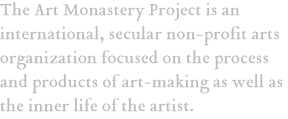Chapter 6 of Augustine’s Rule
Starting on October 2nd, I’ll be doing a Jesuit retreat on the Rule of Augustine (which I’ve written about here: “Up to our necks in Augustine”).
Each day, I’ll read 1 of the 8 chapters of the Rule of Augustine:
Chapter VI
Asking Pardon and Forgiving Offenses
1.Your should either avoid quarrels altogether or else put an end to them as quickly as possible; otherwise, anger may grow into hatred, making a plank out of a splinter, and turn the soul into a murderer. For so you read: Everyone who hates his brother is a murderer (1 Jn 3:15).
2. Whoever has injured another by open insult, or by abusive or even incriminating language, must remember to repair the injury as quickly as possible by an apology, and he who suffered the injury must also forgive, without further wrangling. But if they have offended one another, they must forgive one another’s trespasses for the sake of your prayers which should be recited with greater sincerity each time you repeat them. Although a brother is often tempted to anger, yet prompt to ask pardon from one he admits to having offended, such a one is better than another who, though less given to anger, finds it too hard to ask forgiveness. But a brother who is never willing to ask pardon, or does not do so from his heart, has no reason to be in the monastery, even if he is not expelled. You must then avoide being too harsh in your words, and should they escape your lips, let those same lips not be ashamed to heal the wounds they have caused.
3. But whenever the good of discipline requires you to speak harshly in correcting your subjects, then, even if you think you have been unduly harsh in your language, you are not required to ask forgiveness lest, by practicing too great humility toward those who should be your subjects, the authority to rule is undermined. But you should still ask forgiveness from the Lord of all who knows with what deep affection you love even those whom you might happen to correct with undue severity. Besides, you are to love another with a spiritual rather than an earthly love.
[Part of the Daily Lectio series, named after the Benedictine tradition of lectio divina, “divine reading.” Send comments or suggested readings to nathan@artmonastery.org]
Leave a Reply
You must be logged in to post a comment.




